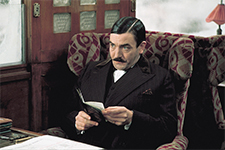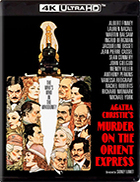Murder on the Orient Express (4K UHD)
|  In the great pantheon of films directed by Sidney Lumet, Murder on the Orient Express, the first cinematic adaptation of Agatha Christie’s 1934 novel, has to stand out as one of the oddest. This is not to say that it is an odd film; in fact, it is quite mainstream and conventional in its evocation of classic murder-mystery tropes and the pleasures of movies packed with a heady mix of American and European stars (the film’s tagline was “The Who’s Who in the Whodunit”) set against a backdrop of the familiar past. Rather, it is odd because it makes for such an uneasy fit in the filmography of a director best known for gritty realism, psychodramas, and theater-to-film adaptations. It does bear in common with Lumet’s other films a preoccupation with guilt and a focus on the blurry lines of that thing we call justice, so in that sense it fits with the larger body of work by the man who directed 12 Angry Men (1958), The Pawnbroker (1964), The Hill (1965), Serpico (1973), Dog Day Afternoon (1975), and Network (1976). As the title suggests, almost the entirety of the film takes place aboard the Orient Express, a luxury passenger train that is travelling between Istanbul and the port city of Calais in the north of France. The setting is 1935, and a prologue informs us of a scandalous crime in which the child of a wealthy family was kidnapped and murdered, with a great deal of fallout for the family and those associated with it (a not-so-subtle reference to the Lindbergh kidnapping in 1932, the original “Trial of the Century”). The emphasis on this dark past event clearly relates to the plot at hand, although the exact connections are not revealed until the end of the film. In the meantime, we are left to try to piece together why American businessman Samuel Ratchett (Richard Widmark) has turned up dead in his cabin, having been stabbed multiple times in the middle of the night. Luckily, the famed Belgian detective Hercule Poirot (Albert Finney) is on-board, entirely because of strings pulled by his friend, Bianchi (Martin Balsam), a director with the company that operates the Orient Express. As with any good Agatha Christie yarn, there is a wide range of potential suspects, each of whom seems as unlikely as the next. We have the loud-mouthed and ever-so-uncouth American socialite Harriet Hubbard (Lauren Bacall); the English governess Mary Debenham (Vanessa Redgrave); the pious Swedish missionary Greta Ohlsson (Ingrid Bergman, who won an Oscar for the role); Ratchett’s nervous secretary Hector McQueen (Anthony Perkins) and his unflappable valet Edward Beddoes (John Gielguld); slick car salesman Gino Foscarelli (Denis Quilley); the very nearly vampiric Russian Princess Natalia Dragomiroff (Wendy Hiller covered in latex and make-up) and her German maid, Hildegarde Schmidt (Rachel Roberts); the effete Hungarian Count Rudolf Andrenyi (Michael York) and his wife Elena (Jacqueline Bisset); the stern British Army Colonel John Arbuthnott (Sean Connery); and the American theatrical agent Dick Hardman (Colin Blakely). Poirot interviews each of them one by one, with the running joke being that, at the conclusion of each interview, Bianchi declares that that person must be culprit (at one point he literally declares, “The butler did it”). But, alas, things are not so simple, which anyone who has read a Poirot mystery or watched one of their untold number of stage and screen adaptations can attest. As played by Albert Finney, the third actor to step into Poirot’s highly polished shoes (following Austin Trevor and Tony Randall), Poirot is a uniquely eccentric genius whose flair for verbiage is matched only by the impeccable nature of his grooming (one of the film’s best moments of visual humor shows us the process that Poirot goes through before bed to ensure that his hair and moustache are kept in order). There is something simultaneously absurd and enthralling about Poirot, which makes him such an intriguing figure. Finney leans heavily into the eccentricities, and at no point does he feel like anything other than a well written and cleverly played conceit, but I am not sure we would want him to be otherwise. The whole idea behind Poirot is that he has deductive and investigatory skills that go far beyond the bounds of mere mortal men, so why would he act like one of them? Finney’s portrayal was roundly applauded, earning him the second of his eventual four Oscar nominations for Best Actor (the first was for the title role in 1963’s Tom Jones). Murder on the Orient Express was the last feature film written by Paul Dehn, who began as a film critic, then wrote for the theater, and then created an absolutely fascinating career as a screenwriter that found him winning an Oscar for collaborating on his first effort, Seven Days to Noon (1950), co-writing the iconic James Bond film Goldfinger (1964), adapting Shakespeare for Franco Zefferilli’s notorious 1967 adaptation of The Taming of the Shrew (1967) with Elizabeth Taylor and Richard Burton, and working on three Planet of the Apes sequels. The film was shot by the great British cinematographer Geoffrey Unsworth, who had recently won Oscars for lensing Becket (1964) and Cabaret (1972), the latter of which helped kick off the retro-nostalgic Hollywood craze of the ’70s that Murder on the Orient Express is very much a part of. The visual potential of the film is inherently limited by its setting aboard a narrow train, but Unsworth and Lumet find every means possible of making it visually intriguing. The freezing cold weather outside the train, especially when it is stopped by an avalanche that covers the tracks, adds to the film’s tension, as well as its icy humor. Lumet knows better than to take it too seriously, and the actors are right there with him, playing their characters to the hilt, whether it be Perkins’s nervous-Nelly mannerisms, Connery’s overinflated ego, or Bergman’s breathy piousness. Agatha Christie’s works had been and would be filmed many times over, but Lumet’s Murder on the Orient Express, despite being quite a ways out of his wheelhouse, remains one of the genre’s classics.
Copyright © 2024 James Kendrick Thoughts? E-mail James Kendrick All images copyright © Kino Lorber / Paramount Pictures | |||||||||||||||||||||||||||||
Overall Rating: 


 (3.5)
(3.5)


